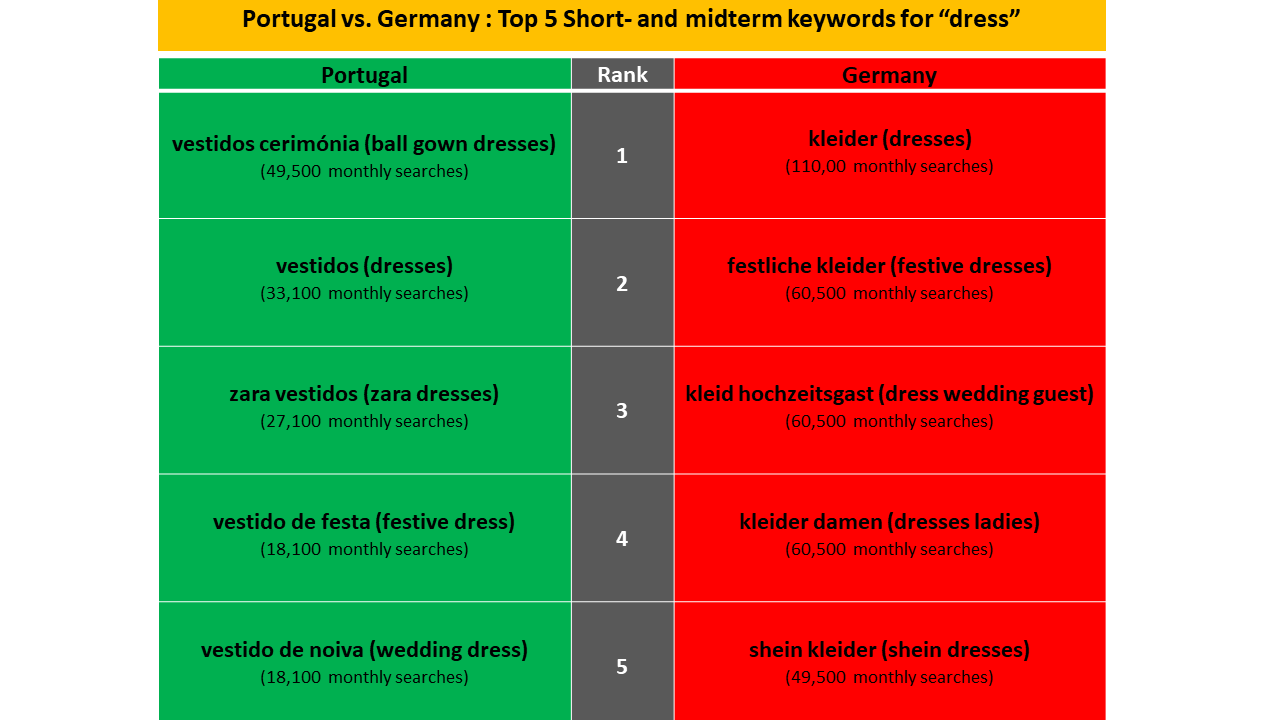Everything SEO is on point in your enterprise – when it comes to your home market. Time for a big decision: It’s time to go international.
You hire professionals to get your keywords translated. Everything works well at home, so direct translation is your bet. That’s a common first mistake, as your foreign audiences don’t just speak another language.
They also use language differently, search differently – maybe even for different things. Or they look for different things in the same products. This is where even your product management comes into play!
In other words: Your future international customers are not only from different countries. The cultural backgrounds of your global audiences are diverse, and their needs may be different.
When it comes to content formats, for instance, preferred styles and possibly even search engines. This is where glocal SEO comes into play.
This is where glocal SEO comes into play.
What‘s Glocal SEO?
Glocal SEO is a simple idea with an incredibly complex execution. We’re combining the words global and local because executing global SEO requires a unique local SEO strategy for each location. “Global” feels bigger and separate from local SEO, but the truth is that global SEO is made up of many different local SEO campaigns.
There’s a lot to consider when entering a new market, so let’s make sure you don’t miss out on anything!
Local Competitors: A Global Concern For Your Business
Your target audiences may already live in fruitful relationships – with very local vendors you may not ever have heard of. More likely than not, this will be somebody who’s not on your list of global or domestic competition.
It all comes down to a local content gap analysis. Local keyword research is only a part of it – albeit an important one.
Always keep in mind that this doesn’t mean a mere translation of your keywords: Each market needs its own keyword analysis from scratch, as thoroughly as you did for your home market. And with the same – local! – expertise.
Each market needs its own keyword analysis from scratch, as thoroughly as you did for your home market.
This also comprises an analysis of the local services available to each audience – and of their respective local ranking (which may surprise you). It can’t be stressed enough that these often rather small, very local competitors can be completely different across regions.
In other words: You need local language and local marketing expertise not just to translate your content, but also to perform competitor research. You need to understand the environment and the culture you’re moving into, and that goes much beyond word-for-word translation.
Learn From The Locals
Once you know about local competitors, dig deeper:
- What do they offer that you don’t (yet)? What are their best ranking content formats?
- Do they use videos successfully? How are those structured?
- Are they focused on picture carousels? Blog posts? Of what kind?
- And of course: What are their most successful keywords?
All of these aspects provide the most valuable information for your own strategy in each locale; audit your own content for the respective market in comparison – and be honest to yourself: Is your approach to the targeted audience really on point?
Let’s look at how different priorities are among cultures, even when just searching for a “dress”.
We compared the top five rankings of short- and midterm keywords used in Portugal vs. Germany (Semrush rounds the absolute numbers, so that they only seem to be identical on various ranks. Please also bear in mind the different sizes of the countries, thus the different scales of volume):
-

Image created by Acolad, June 2022.
Now, draw your conclusions:
- Can you proceed based on the foreseen content, just optimizing it?
- Do you need to create new, targeted content from scratch – possibly in new formats?
A Video Is A Video Is A Video? No – Do Your Glocal SEO First!
Let’s say your local expert provided you with insights indicating a need for more video content: Don’t just hop on the bandwagon and convert any written content to text bits moving on the screen.
Instead, get a deep analysis of which video formats are performing well among your target group for each respective market: Can they be more text-based, or does your regional audience prefer human interaction? What should the dress code be for the protagonists? Could you possibly need local actors?
Do you rather intend to cater a region that demands video formats with high interactivity, such as instant commenting, directly on the screen – as in China, for instance?
Do you need to go live, seizing the opportunity for flash sales? Or may you rank better with how-to videos, directly linked to your products?
The same thorough local analysis needs to be done for each format identified as more valuable for your target group – at each locale.
Consider How Audience-Specific Channels & Content Formats Are
Always keep in mind that how you leverage channels and different content formats may need to change when you go international. Once again: The marketing wisdom from home may not be applicable abroad.
Even how to present a blog post to your audiences depends on their preferences: Do you cater to a market that requires a lot of visual support?
If so, would they rather connect via photos of people they can identify with, for example – or do they prefer the logical support of diagrams? What are their cultural implications of certain colors?
Do they need information presented in very “digestible” forms such as catchy bullet points, or do you have to provide thorough reasoning to earn their trust?
Are they rooted in a competitive society that always strikes for efficiency honoring Top Ten/Five/Three lists?
Do they easily relate to information when brought across personally, via an interview? Which tone do they prefer: rather formal? Or do you blend in more naturally with an informal approach?
Glocal SEO means treating each region and audience as unique.
Localization experts can help you understand how audiences interact with different channels and formats in your target locations – even when there are cultural differences and different digital marketing frameworks to consider. That’s why you need localization experts, not just translators.
Glocal SEO Needs Both: Technology & Local Expertise
All related questions can be answered with data; but it takes expertise to filter what’s relevant, interpret it right, and convert the findings into local, successful content.
It takes the right technology; Semrush is just an example. But don’t be fooled: No technology is smarter than the person using it. This is where true experts can shine.
Thanks to their local cultural insight, they will:
- Find the information that matters for your purposes.
- Validate the data about your target market and interpret it right.
- Enrich it and predict future trends.
If your product line is a very specialized one, make sure your local SEO specialist is familiar with your product range, as well! The same goes for the local linguists who will be recreating your content for each respective market.
Why Glocal SEO Needs A Say In Your Technical Approach
Even technical approaches differ among regions. In some Asian markets, for example, you may rather completely swap your website for micro sites, integrated into the apps of leading local portals.
Other locales call for your own apps; often as a complementary option, sometimes rather as an alternative. Everything depends on the individual combination of your sociological target group, their locale, and your product.
The Wrong Payment Method Can Cost Your Business
Last but not least: even with perfectly localized content and channels, you can’t create any sales if you don’t adapt the payment options just as well! Believe it or not, neither MasterCard nor Visa work everywhere.
There are countries where you don’t even need to think about generating sales without being integrated into payment options of domestic portals that host your content. Checkout via apps has become practically mandatory in many countries – but which system does your local target group trust?
Many audiences are very particular about the payment services they use. Some of them won’t even accept anything but purchase on account!
As essential as the adaptation to local payment customs is for localization and overall business, in-house SEO departments easily tend to forget about it.
Glocal SEO Is A Matter Of Experts
The domestic SEO team does a fantastic job when comprised of the most skilled SEO experts for the home market.
But when growing across borders, there’s no “one size fits all” approach. Even the most perfect native strategy needs to be tailored, specifically for each market.
For your SEO, this means: When going international, you need to go local. With local SEO experts.
That’s what glocal SEO is all about. It takes experience and a worldwide network. Get the best experts on board – for the optimal ROI of your hard work!
Make your international SEO a glocal success – everywhere!
Subject matter and local expertise plus latest technology, at your service worldwide.
The opinions expressed in this article are the sponsor's own.



